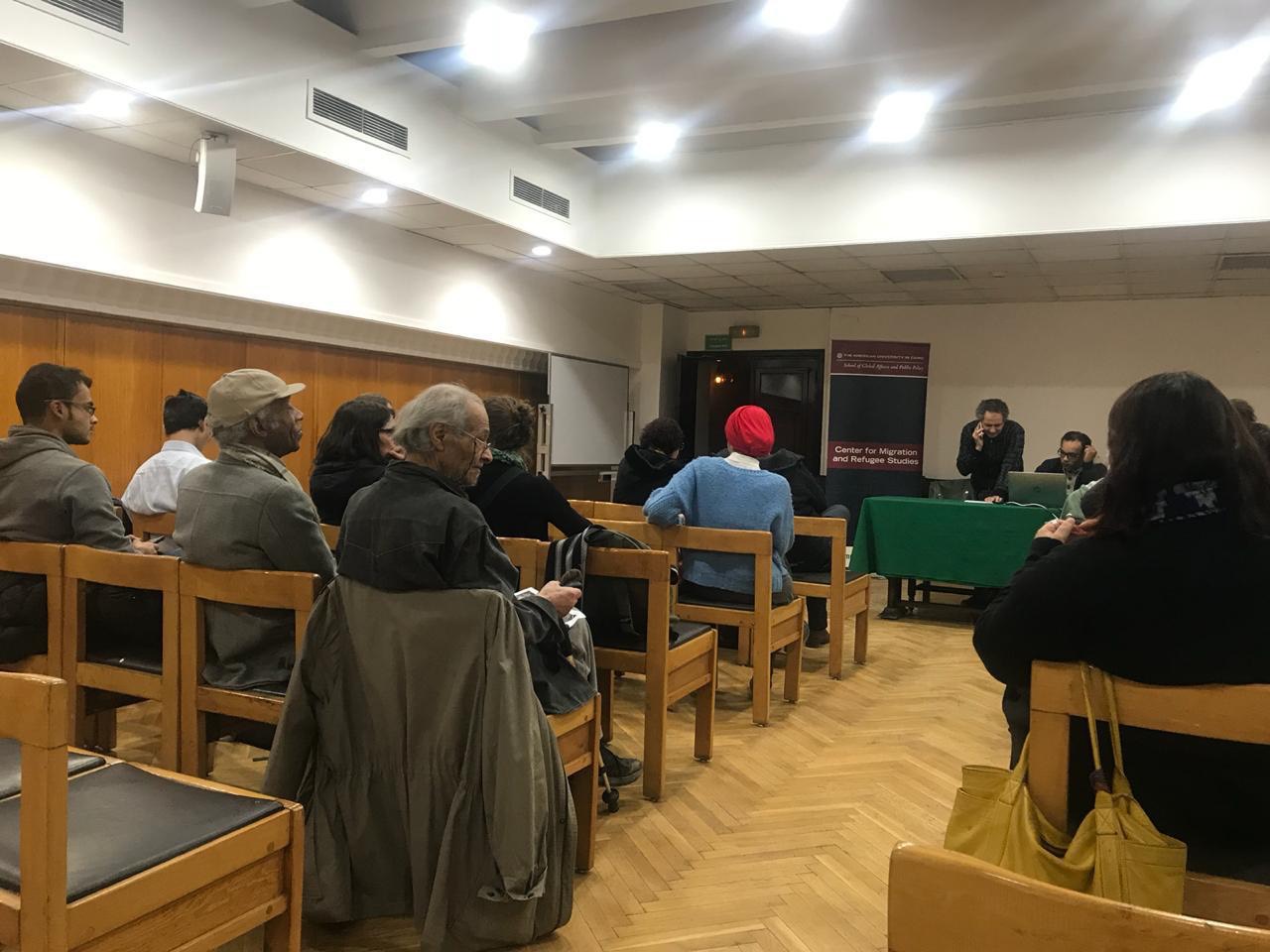By: Aya Aboshady
@Aya_Abuchadiee
In its first ever screening in the region, the 90-minute Iranian-Kurdish film shot with a mobile camera, “Chauka, Please Tell Us the Time” (2017) was presented at the AUC Tahrir campus on February 28.
The film was directed by the Kurdish Journalist Behrouz Boochani, who was and still is detained on Manus Island camp by the Australian government. To produce the film, he collaborated with the Iranian-Dutch Director Arash Kamali Sarvestani via email and WhatsApp.
The film revolves around over 2,000 refugees, including women and children, who came to Australia by boats seeking asylum but were instead, taken to prison, indefinitely detained and systematically tortured without being convicted of anything.
“At that time, the offshore prisons were entirely locked up, no one was allowed in or out, but Boochani managed to smuggle a mobile device in, contacting people using WhatsApp, and that’s how it all started,” said Professor Omid Tofighian, assistant professor of Philosophy at AUC.
From 2016 onwards, phones were permitted and prisoners started roaming the island itself. They were not completely locked up inside the prisons like the first three-and-a-half years because the Papua New Guinea (PNG) Supreme Court had ruled that the Australian Detention Centers are unconstitutional. With that, Tofighian said that they still couldn’t exit the island itself.
They have no papers, no rights and nowhere to go but the prisons, where they have a place to sleep and food to eat at least
“Therefore, they’re currently refugees but not refugees, prisoners but not prisoners, this is a prison camp but not a prison camp. The situation is really strange, which is why I call it a new colonial experiment,” he added.
Essentially, Sarvestani, who had been trying to reach anyone from the Australian detention centers for so long, got in touch with Boochani after reading some of his articles across the different news outlets he has written for; The Guardian, Huffington Post and Financial Review.
To his luck, Boochani was very open to the idea of filming the insides of the camp, explained Tofighian,.
Tofighian is the one responsible for bringing this film here, was involved in its promotion and was the one who worked on the subtitles for the film itself. He also translated Boochani’s “No Friend But the Mountains”, a novel written by text messages.
He explained the entire situation is also completely bizarre because not everyone, including Australians, know about this. Additionally, those who know are not doing anything about it, and that goes for human rights organizations as well.
“It’s also strange because almost none of those refugees have done anything illegal. They were seeking asylum and that is no crime even under the Australian law. However, this is a huge political issue because it always depends on who you are and where you come from,” he added.
As he is a migrant himself having gone from Iran to the United States to Australia as a child, Tofighian has a personal connection to the issues discussed in the film.
“The more you scare people about refugees and migrants, the easier it is to convince the voting population to support your policies even if they’re really harsh,” he said.
Tofighian explained that people from Indonesia, Sudan, Somalia, Iran, Iraq, Lebanon, Syria, Pakistan started coming to Australia by boats between 2009 to 2012. Some politicians used this as weapon against the Labor Party government which was in power, by saying that they are not doing enough to stop refugees from ‘invading their space.’
“This policy is not even announced. Hence, people who were detained had no idea. Boochani came to Australia exactly four days after the policy’s implementation, then was immediately sent off and exiled by force to Manus with the others,” Tofighian added.
At the world premiere of the film at the Sydney Film Festival and the international premier at the BFI London Film Festival, the audience were shocked as a majority were unaware of the existence of these camps.
The results were no different within the AUC audience either.
“I still can’t process what I’ve just seen in the movie. The information isn’t really shocking because I already know, but seeing it on screen is very different. The live situation is much worse and it’s really emotional,” said Jenna Moss, 26, an AUC graduate who did her masters in Migration and Refugee Studies.
The screening was organized by the Center for Migration and Refugee Studies in collaboration with the Department of Philosophy.
